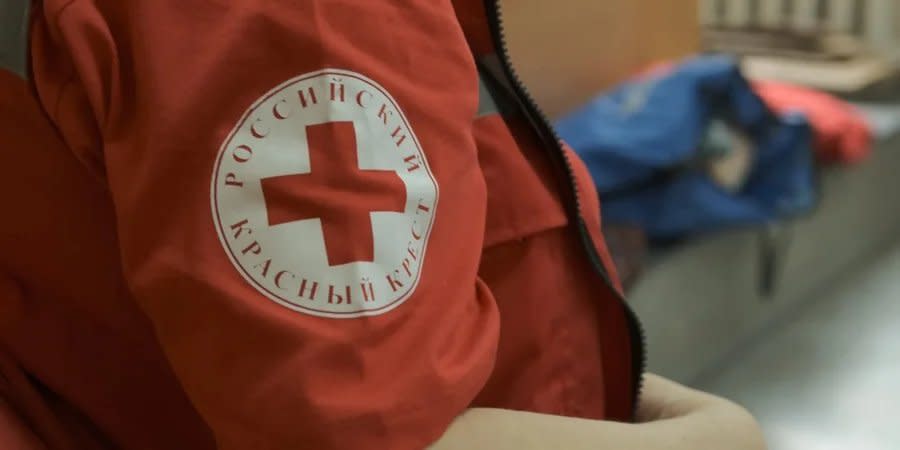Meduza investigation: Russian Red Cross involved in systematic abuse and mistreatment of captured Ukrainians

The Russian Red Cross (RRC) is involved in the abuse and mistreatment of captured Ukrainian soldiers, openly supports the war against Ukraine in the occupied territories, and hosts Ukrainian refugees together with the Russian military, according to an investigation by the Russian media outlet Meduza, published on Feb. 27 as part of the international journalism project Kremlin Leaks.
The leaked internal documents, which come from the Russian Presidential Administration, show that the state has allocated funds to the RRC for work in the "new territories,” which refers to the occupied territories of Donetsk, Luhansk, Zaporizhzhya and Kherson oblasts.
Unlike the International Committee of the Red Cross (ICRC), national Red Cross societies do not have a mandate to work in armed conflict zones. But the RRC began to show interest in working with residents of the occupied territories of Ukraine during the first months of the open war. For example, RRC representatives provided humanitarian aid in the devastated Russian-occupied city of Mariupol.
Ukrainian soldier Orest Hrytsiuk, who was in Russian captivity, told Meduza about abuses committed by the alleged RRC representatives in the Horlivka colony, specifically recounting an episode in the dining hall.
"They give you very little time to eat [in the colony], and I hated myself for the way I ate,” said Hrytsiuk.
“I'm an intelligent person, I have two degrees... And there we had to eat very fast and very hot. Everything was flying in all directions. And these two men in civilian clothes walked between the tables, and one of them said: ‘Oh, how well they eat, like pigs, Ukrainian pigs. Well, eat, eat, Russia loves you and takes care for you.’”
After the meal, the prisoners were taken to the yard and forced to sing Soviet military songs. The alleged RCC representative "requested songs" and recorded Ukrainian prisoners on his phone as they marched. He approached them, shouted something in their ears, and shook his fist above their heads, and slapped their backs and shoulders, causing them to stagger.
"He turned the camera on himself and made a gesture of victory, he enjoyed it, it was a performance for him," Hrytsiuk said, adding that the two so-called "human rights activists" had complete freedom of action.
"They could walk in the dining room, be on the parade ground, order songs, and the parade ground is the holy of holies, you can't just walk on it. If you're not in the military, you're supposed to walk around the parade ground. And they were comfortable there, they were having a good time."
The presence of outsiders was never explained to the prisoners.
According to a representative of the Ukrainian Coordination Center for the Treatment of POWs, Yuriy Taranyuk, the ICRC claimed that its staff did not visit the Horlivka colony and did not behave as described by Hrytsiuk. The official representative of the ICRC in Ukraine, Ashil Despres, confirmed that the organization was "investigating" the situation and that none of its staff was on the ground in the occupied territories of Ukraine. Taranyuk, however, claimed that the Ukrainian authorities were aware of other cases of violations by the RRC, particularly in the occupied territories.
The investigation revealed that the RRC collected donations on its website to support the families of mobilized Russians and also worked with Ukrainians who ended up in Russia after the start of the full-scale invasion.
Read also: UN says 90% of Ukrainian prisoners of war have been tortured by Russians
"Mugs with Putin and the letter Z" were being brought to Ukrainians as “humanitarian aid,” Verstka wrote A Russian human rights activist familiar with the organization's activities, who spoke to journalists on condition of anonymity, said that the RCC employees often mistreat Ukrainian war refugees by making appointments with them in the same premises as participants in the so-called “special military operation” receiving psychological treatment for PTSD.
According to Vershka, the RRC employees were often rude to Ukrainian refugees and refused to help them.
The RRC head, Pavel Savchuk, who refrained from making public statements about the war, awarded the Avangard defense plant, which produces S-300 and S-400 air defense missiles, with a certificate for winning a blood donation competition. He also signed a cooperation agreement with the Defenders of the Fatherland state fund which is under EU sanctions.
According to Gleb Bogush, an expert in international criminal law at the University of Copenhagen, the ICRC has limited options in situations where national organizations violate international law, as harsh statements can lead to a complete ban on their operations in the country.
The Ukrainian Coordination Center continues to cooperate with the ICRC, but faces restrictions on its ability to visit places where Ukrainian prisoners of war are being held by the enemy, such as the Olenivka colony.
Sanctions have been imposed on the RRC in Ukraine, prohibiting its activities until 2033. The sanctions were also imposed on Savchuk for "spreading Kremlin propaganda narratives to justify Russia's actions against Ukraine".
We’re bringing the voice of Ukraine to the world. Support us with a one-time donation, or become a Patron!
Read the original article on The New Voice of Ukraine

